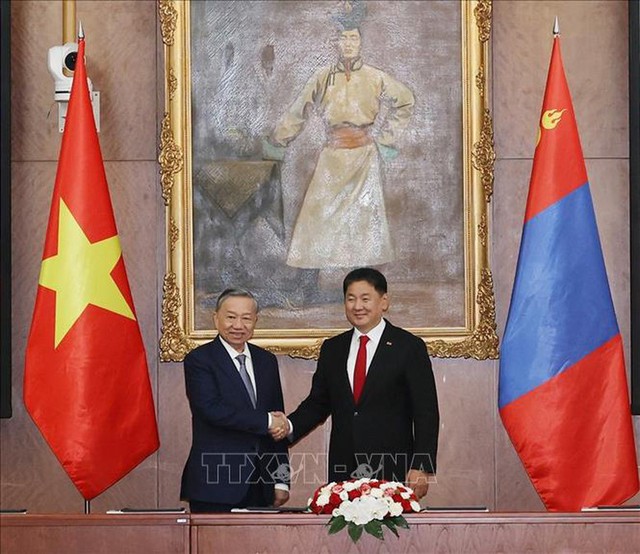Viet Nam, Mongolia establish comprehensive partnership
VGP - General Secretary and President To Lam and Mongolian President Ukhnaagiin Khurelsukh have agreed to upgrade the Viet Nam-Mongolia relations to a comprehensive partnership.

General Secretary and President To Lam (L) and Mongolian President Ukhnaagiin Khurelsukh hold talks, Ulaanbaatar, Mongolia, September 30, 2024 - Photo: VNA
The two leaders held talks on Monday in Ulaanbaatar, on the occasion of the Vietnamese leader's two-day state visit to Mongolia.
Khurelsukh highly valued To's visit, which would significantly contribute to promoting the bilateral ties, asserting that Mongolia treasures its relationship with Viet Nam and considers the Southeast Asian nation one of its key strategic partners in the region.
Khurelsukh expressed thanks to the State and people of Viet Nam for the grant of US$500,000 to help Mongolia overcome the consequences of natural disasters.
To, for his part, expected that Mongolia will successfully implement the "New Recovery Policy" and the goals and targets set out in the Vision 2050 to improve its role and status in the world.
The two leaders discussed major directions and specific measures to realize high-level agreements, with national defense-security cooperation as a key pillar.
They underlined the need to increase all-level delegation exchanges, effectively carry out existing cooperation and dialogue mechanisms, and step up cooperation in diplomacy, defense-security, and justice.
Both sides vowed to boost stronger ties in preventing trans-national crime and participating in the United Nations peacekeeping operations, while continuing to support the development of cavalry, a symbol of the bilateral ties.
They pledged to foster substantive and effective development of economic cooperation, maintain bilateral economic cooperation mechanisms, including the intergovernmental committee on economic, trade, scientific, and technical cooperation, and enhance trade promotion and business connectivity activities.
The host and the guest stressed the importance of strengthening cooperation in hi-tech research and development, digital technology, innovation, artificial intelligence, information and communication technology, climate change adaptation, mining and animal farming.
They exchanged views to overcome challenges in logistics transport, share experience regarding education mechanisms and policies, increase culture-art-tourism promotion programs, and facilitate locality-to-locality and people-to-people exchanges.
The two nations will continue to bolster close coordination and enhance mutual support at global and regional frameworks and forums of which they are members, such as the United Nations, the Asia-Europe Meeting (ASEM), the World Trade Organization (WTO), and the ASEAN Regional Forum (ARF), they emphasized.
They underscored the importance of ensuring peace, security, safety and freedom of navigation and aviation in the East Sea, maintaining an environment of peace and stability, upholding the rule of law and settling disputes at sea via peaceful means, ensuring the legitimate rights and interests of nations in accordance with international law, including the 1982 United Nations Convention on the Law of the Sea (UNCLOS)./.
